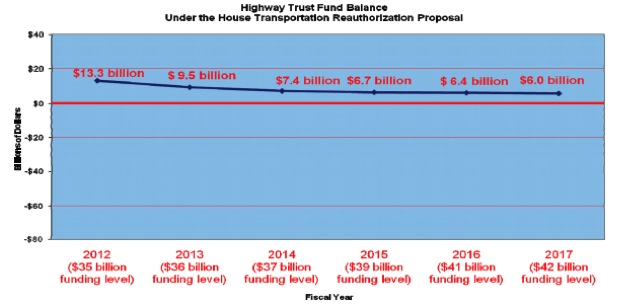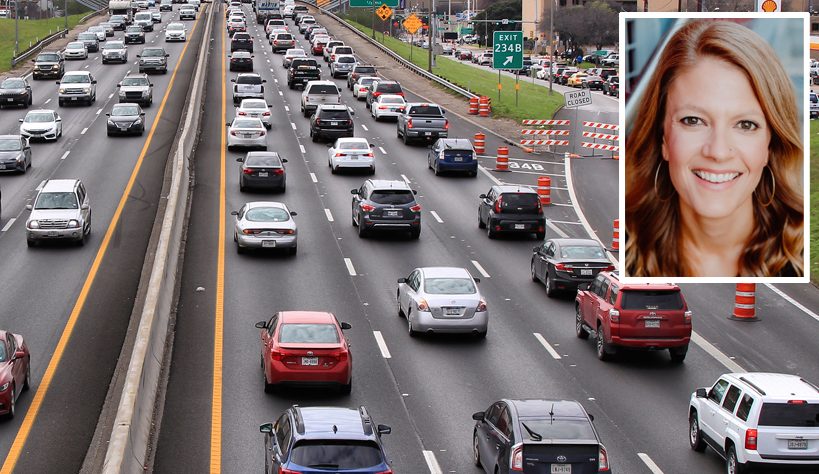Mica: “The Focus of the Bill Is on the National Highway System”
12:57 PM EDT on July 8, 2011

First, to recap:
The transportation reauthorization proposal that House Transportation Committee Chair John Mica unveiled yesterday (sans legislative text) calls for $230 billion over six years, cutting 33 percent out of current spending levels. The plan maintains the current 80/20 split between highways and transit funding, supports state infrastructure banks in lieu of a national one, and expands the popular and oversubscribed TIFIA loan program.
Why a Six-Year Bill
At yesterday’s press event to roll out the bill, Mica and other House members explained their commitment to a six-year bill, in contrast to the Senate proposal of a two-year bill.
“We want long term bill,” Mica said. “We heard across the country that our state secretaries of transportation want some stability.”
Richard Hanna, the vice chair of the Highways and Transit subcommittee, contended that the stimulus failed to boost employment significantly because “shovel-ready,” short-term projects don’t create many jobs.
“By passing a six-year transportation bill, this committee will provide the states and transportation agencies with an established stream of federal funding that will allow them to take on major projects,” said Hanna. “Given this predictability, states will be more comfortable taking on bridge replacement, highway interchange improvements, etc. These are projects that provide jobs for two or three years, not two or three months.”
Without the assurance of a long-term bill, Hanna said, “states will continue to put off major construction projects.”
“The two year plan is a recipe for bankruptcy of the trust fund and also a closedown of long term projects across the country,” said Mica. “And if you don’t believe that, look what’s happened. We’re under a two-year extension right now, which expires in September. That’ll be two years. And look what it’s given us! Not much.”
Even advocates of a short bill agree that a longer one is ideal, as it allows for planning, but they say transportation agencies can’t plan major projects with the tiny trickle of federal funding the House bill would let flow to the states, either. Some state DOT heads say they’d rather have adequate funding for two years than meager funding for six.
Rules and Funding Constraints
Mica made it clear that while he’s also disappointed the funding levels are so low, he’s hampered by the political climate of fiscal conservatism in the House and, more specifically, by House Rule XXI, which includes a “pay-as-you-go” provision [PDF] that Mica takes as a prohibition on spending more than the Highway Trust Fund takes in.
“I wish I could jump over the moon,” Mica said, “but I can’t do that either.”
He said several times that he and other committee members would be appearing before the Ways and Means Committee, which makes decisions about how to fund programs, to appeal for help. He wasn’t very specific about what they’d ask for, though he did mention some bonding and tax credits for private companies investing in infrastructure. He wouldn’t say that he would push for any kind of increased user fee, whether a gas tax hike or a VMT charge.
“We’ve tried to look at every dollar of revenue that’s coming in and how we can maximize it,” Mica said, explaining that by consolidating programs, encouraging private investment and streamlining the review process, he thinks they can “do more with less.”
They’re eliminating 70 programs out of the “mind-boggling” list of federal transportation programs and “devolving to the states the ability to approve” programs. Federal mandates for certain programs (including bike, pedestrian, and other livability programs) will be eliminated, but states will maintain the “flexibility” to spend money on those things. Unfortunately, if history is any guide, many states end up under-spending on these alternative transportation programs, even disproportionately sending bike/ped money back to Washington when called upon to rescind funds from their budgets.
Mica said there will be more money available (despite the smaller size of the bill) for all of those programs because it cuts federal overhead costs and eliminates the need for state and local officials to “hightail it to Washington to talk to some bureaucrat in one of the agencies.”
Focus on Highways
“The focus of the bill is on the national highway system,” Mica said, in answer to a question about the elimination of funding for walkability. “We can’t fund every local project.”
“We’re trying to make certain that our federal responsibility is met first, and that’s our interstates and our major infrastructure projects.”
He then used the opportunity to boast that the bill has no earmarks, reducing the amount spent on frivolous “pet” projects, and that there are no “special set-asides” – Republican code for things like multi-use trails.

The bill doesn’t have any dollar amounts attached to specific programs but Rep. Bill Shuster said that it doesn’t have anything specifically for high-speed rail. Still, he promised that the plan would improve upon the high-speed rail program, which he accused the Obama administration of “mishandling.”
“We’re going to fix it in this bill,” Shuster said, “requiring that projects are truly high-speed – and the definition of high-speed will not be 110 mph; it will be 125 mph.” He also pledged greater transparency.
They’re cutting Amtrak’s funding by 25 percent and placing limits on what the funding can be used for. For example, Shuster said, it couldn’t be “squandered” on lawsuits like one that Amtrak is involved in now.
The plan also calls for improvements to the Railroad Rehabilitation & Improvement Financing Program, which is funded at $35 billion but has only managed to spend about $1 billion in the last 13 years.
No Competition But Private Competition For Transit
Mica is one Republican who has long been a fan of rail and mass transit. At yesterday’s event he said, “When you see the price of one car on the road, and new highway construction through metropolitan areas or even rural areas, you become an advocate of transportation alternatives.”
Still, that support hasn't translated into any breaks for transit in this bill. Even with transit's share of the overall pie staying the same, the reduced overall funding levels would mean a cut from about $11 billion for transit today to about $7 billion.
On the positive side, the proposal would "streamline" the New Starts and Small Starts program for transit, “cutting project development time in half,” according to the plan. Indeed, project development times are slated, under this plan, to go from 15 years to six by making federal reviews happen at the same times, instead of each waiting for another to end.
But overall there's a lot of bad news for transit in this bill. The transit section also encourages private companies to provide public transportation services. House Republicans like what they see in the success of privately run intercity buses and want to see vanpools compete with city buses in urban areas, in addition to more private participation in rail transit. Some critics of private participation at this level worry that private operators will take over the lucrative routes, leaving the slower routes for public agencies to run (and lose money on).
The plan would also repeal discretionary transit programs that the Republicans say are “unpredictable and not transparent,” returning instead to strict formula funding. This move flies in the face of repeated and growing demands for increased performance measures, which would often use discretionary funds as a “carrot” to encourage cost-effective programs that meet national transportation goals.
Indeed, the House bill is notable in its rejection of performance measures and competitive programs like TIGER and the Sustainable Communities grants instituted by the Obama administration. Committee staffer Jim Tymon had to field Streetsblog’s question on performance measures when Mica couldn’t answer it, but Tymon’s response was vague.
He said that performance measures would be developed in conert with USDOT and state DOTs. He said that while states will have increased flexibility for how they spend their money, they will be held accountable for how they meet performance standards. If they don’t meet those standards, he said, they will be made to spend money in the areas where they are underperforming.
An Unlikely Ally
While responses continue to roll in from advocacy groups and lawmakers alarmed by the funding cuts, several notable people called in to Mica’s press event to thank him for the new proposal. One of them was L.A. Mayor Antonio Villaraigosa, a champion of transit investment. He thanked Mica for “listening to the 113 mayors who have gotten behind the expansion of TIFIA.”
“Your proposal to raise the budget authority of TIFIA to a billion dollars goes beyond even what many of us had talked about early on,” Villaraigosa said, “and we think it’s exactly where it needs to be.”
That’s a useful high-profile endorsement for Mica from a pro-transit Democrat. Still, it’s unlikely the mayor will support Mica’s plan over Boxer’s, which also includes America Fast Forward, another plan supported by Villaraigosa to increase federal leveraging of private funds.
Stay in touch
Sign up for our free newsletter
More from Streetsblog USA
Thursday’s Headlines Don’t Like Riding on the Passenger Side
Can you take me to the store, and then the bank? I've got five dollars you can put in the tank.
Study: When Speed Limits Rise on Interstates, So Do Crash Hot Spots on Nearby Roads
Rising interstate speeds don't just make roads deadlier for people who drive on them — and local decision makers need to be prepared.
‘We Don’t Need These Highways’: Author Megan Kimble on Texas’ Ongoing Freeway Fights
...and what they have to teach other communities across America.
Should Wednesday’s Headlines 86 SUVs?
American tax law encourages people to buy the gas-guzzling and deadly vehicles, but some in Canada are pushing to ban them.
Brightline West Breaks Ground on Vegas to SoCal High-Speed Rail
Brightline West will be a 218-mile 186-mile-per-hour rail line from Vegas to Rancho Cucamonga — about 40 miles east of downtown L.A. — expected to open in 2028.




